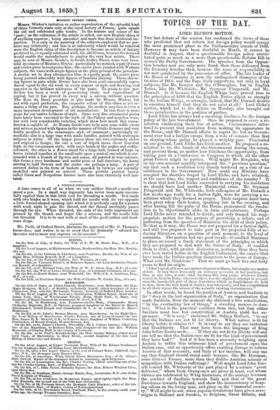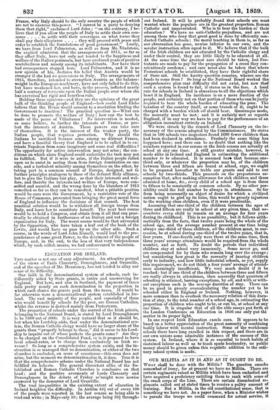TOPICS OF THE DAY.
LORD ELMO'S MOTION.
THE last debate of the session has confirmed the views of those who predicted that not reform but foreign policy would occupy the most prominent place in the Parliamentary annals of 1859. However at may have been doubtful in March, it cannot be doubtful in August, that a questionable foreign policy contri- buted quite as much as a more than questionable Reform Bill to overset the Derby Government. The speeches from the Oppai- tion benches now are only more frank than those delivered from the Treasury benches then, because the sense of responsibility is not now quickened by the possession of office. The late leader of the House of Commons is now the undisguised champion of the treaties of 1815, and the Pope finds supporters, not only in loyal subjects, like Mr. Bowyer and the O'Donoghue, but in English Tories, like Mr. Whiteside, Mr. Seymour Fitzgerald, and Mr. Disraeli. Is it because the English Whigs have proved true to the principles of 1688 that the English Tories object so strongly to the Italian Whigs, so strongly, indeed, that Mr. Disraeli desires to convince himself that they do not exist at all ? Lord Eloho's motion, which led to the debate on Monday, also brought out these peculiarities in the position of parties. Lord Elcho has always had a sneaking kindness for the foreign policy of the late Government. Once he proposed to carry .a re- solution vindicating their line of action. Circumstances inter- fered to prevent that resolution from making its appearance in the House, and Mr. Disraeli affects to regret it; but no Govern- ment ever had a luckier escape from a vote of censure than that in shaping whose policy he played a weighty part. Frustrated on one ground, Lord Mho has tried another. He proposed a re- solution to tie the hands of the Government during the recess, and prevent them, no matter how felicitous the opportunity, from taking part in a Conference or Congress to which all the other great Powers might be parties. Well might Mr. Kinglake, who on his own account sensibly interposed the " previous question,' say that such a resolution very closely bordered on a vote of no confidence in the Government. How could any Ministry have accepted the shackles forged by Lord Elcho, and have retained, at the same time, the respect and confidence of the country ? It is clear that had Lord Elcho succeeded in carrying his resolution we should have had another Ministerial crisis. Mr. Seymour Fitzgerald and Mr. Whiteside, both colleagues of Mr. Disraeli a few weeks ago, ready for a faction fight, were for carrying a re- solution which they deemed so proper. Their surprise must have been great when their leader, speaking late in the evening, and after having felt the pulse of the House, pronounced the resolu- tion to be objectionable alike in form and substance. Perhaps Lord Elcho never intended to divide, and only framed his inap- propriate motion for the purpose of provoking a debate, and of gathering from the speeches of Ministers the drift of their policy. Be that as it may, the House was not prepared for a faction fight, and still less prepared to take part in the projected folly of re- ducing Ministers, on a question of such moment, to the level of automata. The motion had one good result—it enabled Ministers
to place on record a frank statement of the principles on which they are prepared to deal with the future of Italy. It enabled them to state, with greater distinctness, perhaps, than they have ever been stated before in the English Parliament, the causes that have made the Italian question dangerous to the peace of Europe. What said Mr. Gladstone ? That we must go back five and forty years to find its origin.
"Idon't speak of it now as a matter of praise or blame, but simply as a matter of fact. It may have been only an unhappy necessity of her position, but this, at any rate, is true—that for forty-five long years, wherever liberty reared its head in Italy, wherever there was the slightest attempt to procure even the hundredth part of those franchises which as Englishmen we hold so dear, there the iron hand of Austria has interposed, and has reestablished in all their rigour the abuses of the actually existing Governments."
In other words, he found the position of Austria and Sardinia to lie " deep in the bad organization of Italy," an organization that made Sardinia, from the moment she obtained a free constitution, " by the everlasting law of things," a standing menace to Aus- tria. What is the practical corollary from this, but that either Sardinia must lose her constitution or Austria yield her su- premacy. " It is easy," exclaimed Mr. Sidney Herbert, " to say that the Italians are not fit for liberty. What nation is fit for liberty before it obtains it ? It is easy to say they are turbulent and bloodthirsty. That may have been the language of King John before Runnymede. . . . If they are not fit for liberty will any one tell me that the Italian race are fit for the kind of government they have had ?" And if it has been a necessity weighing upon Austria to inflict this infamous kind of government upon the Italian race, and an opportunity offers enabling Europe to relieve Austria of that necessity, and Italy of her incubus, will any one say that England should stand aside because, like Mr. Horsman, some distrust France, more than they dislike Austrian misrule or sympathise with Italian sufferings ? Well might Lord John Rus- sell remind Mr. Whiteside of the part played by a certain "great deliverer," whom Irish Orangemen are prone to toast, and whose virtues are celebrated by Whig historians, of the analogy between the conduct of Sardinia towards Italy and that of the great Dutchman towards England, and show the inconsistency of heap- ing odium on the living man, and glory on the " immortal memo- ry.' Well might he ask, when popular revolutions have given sove- reigns to Holland and Sweden, to Belgium, Great Britain, and France, why Italy should be the only country the people of which are not to exercise this power. "I cannot be a party to denying them that right," exclaimed Lord John ; " on the contrary, I be- lieve that if you allow the people of Italy to settle their own con- cerns . . . . to settle with their sovereigns on what terms they shall pay their allegiance . . . . they will proceed with peace and order to establish the foundations of good government." Lastly, we have from Lord Palmerston, as well as from Mr. Gladstone, the explicit admission that the arrangements of 1815, so far as they affect Italy, have not only not tended to the happiness and welfare of the Italian peninsula, but have produced years of positive wretchedness and misery among its inhabitants. Nor have their bad consequences stopped here. Lord Palmerston, and it is no new opinion of his, declares his belief that Austria would be stronger if she had no possessions in Italy. The arrangements of 1815, therefore, intended to strengthen Austria as the balance- weight in the European machinery, have not only failed to do this, but have weakened her, and have, in the process, inflicted nearly half a century of torments upon the Italian people over whom she has exercised her rigid and heartless rule.
Holding these opinions—and they are the opinions of the great bulk of the thinking people of England—how could Lord Elcho believe that the House would consent to a resolution binding the Government to inaction ? The practical question is—What can be done to promote the welfare of Italy ; how can the best be Made of the peace of Villafranea ? No intervention is needed, as some believe, to further the interests of France, or pro- tect the interests of Austria. These powers can take care -of themselves. It is the interest of the weaker party, the Italian people, that requires protection. Why should the Italians be sacrificed because some among us distrust France, and have a fanciful theory that England is to be called in to ex- tricate Napoleon from some imaginary and some real difficulties ? The opportunity for active intervention may not arise ; the con- ditions on which alone England could undertake the task may not be fulfilled. But if it were to arise, if the Italian people called upon us to assist in saving them from foreign domination on one side, and a turbulent minority among themselves on the other, by taking part in a common council of Europe, designed, not to further principles analogous to those of the defunct Holy alliange, but to give the Italians fair play, so that their interests and wel- fare, and thereby the interests and welfare of Europe, were cots= stilted and secured, and the wrong done by the blunders of 1815 iremedied so far as they can be remedied, what a pitiable position would be ours were the Government, by a restrictive vote of the House of Commons, prevented from bringing the great moral force of England to influence the decisions of that council. The best practical solution would be to withdraw all foreign troops from Italy, and leave her to constitute herself. The next best course would be to hold a Congress, and obtain from it all that can prac- tically be obtained in furtherance of an Italian and not a foreign organization for Italy. The worst course would be that advocated by the Opposition, who have taken a leaf out of the book of the Levite, and would have us pass by on the other side. Such a course, in the words of Lord John Russell, would lead to the pre- ponderance of some great Power, to the detriment of the people of Europe, and, in the end, to the loss of that very independence which, by such selfish means, we had endeavoured to maintain.



























 Previous page
Previous page